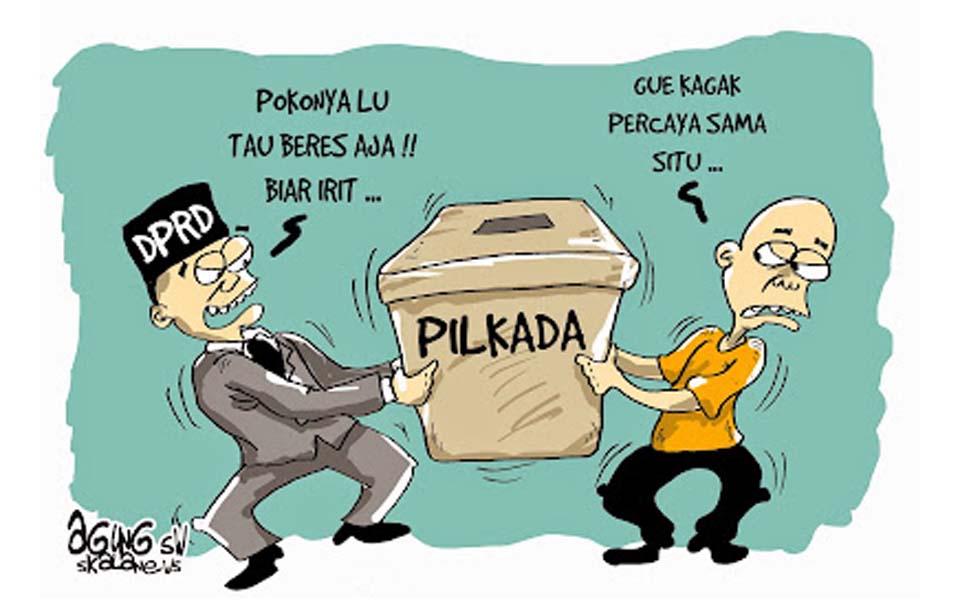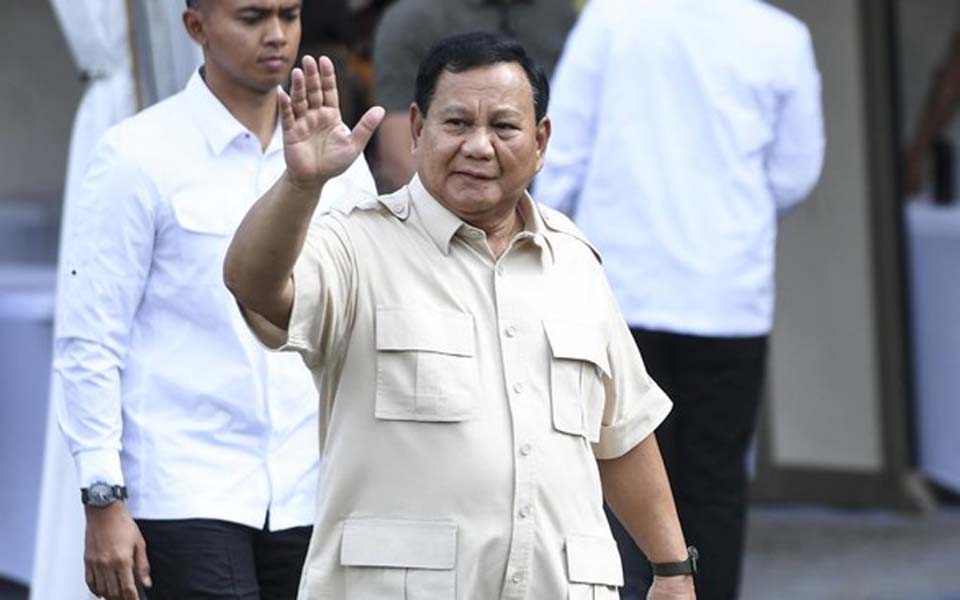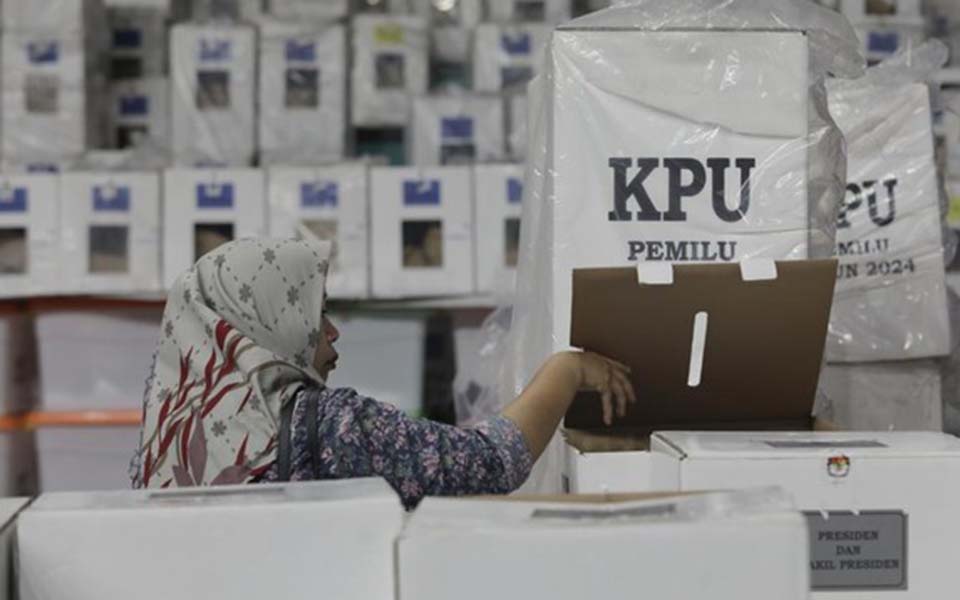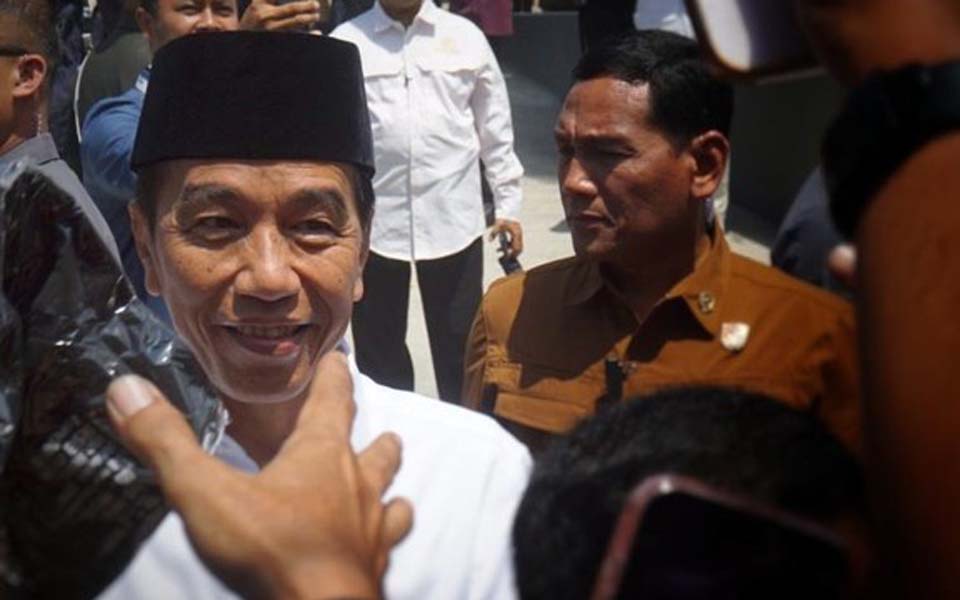Fitria Chusna Farisa, Jakarta – On Monday December 11, Kompas Research and Development (Litbang Kompas) released its latest survey on the electability of presidential (capres) and vice presidential (cawapres) candidates in the 2024 elections.
The survey was held between November 29 and December 4, and involved 1,364 respondents selected randomly using a multi-level systematic sampling method across 38 provinces in Indonesia.
Using face-to-face interviews, the survey had a 95 percent level of confidence and a 2.65 margin of error under the conditions of a simple random sample selection. The survey was fully funded by the Kompas daily newspaper.
The followings are the findings of the survey of the electability of presidential candidate tickets in 2024 elections.
Prabowo-Gibran on top
According to the survey, presidential ticket number 2, Greater Indonesia Movement Party (Gerindra) Chairperson Prabowo Subianto and President Joko "Jokowi" Widodo's eldest son Gibran Rakabuming Raka, were in first place. The ticket backed by the Indonesia Onward Coalition had an electability level of 39.3 percent.
Then following in second place with a wide vote margin is ticket number 2, former Jakarta governor Anies Baswedan and National Awakening Party (PKB) Chairperson Muhaimin Iskandar, who are backed by the Coalition for Change, with an electability of 16.7 percent.
Meanwhile ticket number 3, former Central Java governor Ganjar Pranowo and Coordinating Minister for Security, Politics and Legal Affairs Mahfud MD, who are backed by the ruling Indonesian Democratic Party of Struggle (PDI-P), were in last place with an electability just below Anies and Muhaimin of 15.3 percent.
The survey also measured the electability of the presidential and vice presidential candidates individually. The result was that Prabowo's electability showed a significant increase of almost 8 percent, compared with a survey six months ago.
In contrast to Prabowo, Ganjar and Anies' level of electability decreased with Ganjar's electability dropping sharply by almost 16 percent. Meanwhile, Anies' electability decreased by a range of 2 percent.
Although Ganjar's electability plummeted, he still came in second and was still superior to Anies who ranked last.
The following is a comparison of the electability of the three presidential candidates:
Anies Baswedan
August 2023: 19.2 percent
December 2023: 17.4 percent
Prabowo Subianto
August 2023: 31.3 percent
December 2023: 39.7 percent
Ganjar Pranowo
August 2023: 34.1 percent
December 2023: 18.0 percent
In the electability of vice presidential running mates meanwhile, Gibran pocketed the highest electability surpassing 35 percent, following by Mahfud in second place with an electability in the range of 21 percent and Muhaimin in last position with a range of 12 percent.
Below is a comparison of the electability of the three vice-presidential candidates:
Muhaimin Iskandar: 12.7 percent
Gibran Rakabuming Raka: 37.3 percent
Mahfud MD: 21.6 percent
Regional control
Although their electability declined, Anies and Ganjar's support base in a number of regions remained strong.
In DKI Jakarta (Jakarta province), for example, the Anies-Muhaimin vote was still superior to Prabowo-Gibran and Ganjar-Mahfud, despite decreasing. Anies was able to control 28.6 percent of the vote in the national capital.
Although support for Anies-Muhaimin in Central Java and the Special Region of Yogyakarta (DIY) has begun to increase, it has not been able to rival the support of the two other presidential tickets.
The Anies-Muhaimin ticket was also able to overshadow Prabowo-Gibran's achievements in several regions, such as in areas bordering Jakarta and parts of Banten.
The Anies-Muhaimin ticket was able to control several provinces in Sumatra island, such as Aceh and West Sumatra. Yet if referring to the results of the 2019 presidential elections, these two provinces were Prabowo's strongest political fortress when he was running against President Widodo.
According to the survey, the impact of Prabowo-Gibran's political penetration was felt more by the Ganjar-Mahfud ticket. Compared with the previous survey, Ganjar's supporters shrink by almost half.
A drop in votes of more than 10 percent occurred in several regions outside of Java island such as Sumatra island, Bali-Nusa Tenggara, Kalimantan, Sulawesi and Maluku-Papua.
In several provinces outside of Java, the decline did not erode most of the support for Ganjar-Mahfud. Ticket number 3 voters are still relatively large in North Sulawesi, Bali, Maluku and West Kalimantan.
On Java island, which ipso facto is the main vote base for the PDI-P, Ganjar-Mahfud's achievements have not appeared elegant with a decline in support actually occurring in every province, especially in West Java, Banten and East Java.
In the midst of this decline however, they still control the Central Java, which has long been the basis of Ganjar-Mahfud supporters.
With 31.6 percent of support, Central Java is the only fortress that has not been shaken. This figure exceeds the support for Prabowo-Gibran and Anies-Muhaimin.
The following shows the changes in regional control by the presidential and vice presidential candidates:
Anies Baswedan-Muhaimin Iskandar:
August 2023 survey
Java: 16.7 percent
DKI Jakarta: 42.5 percent
Banten: 23.3 percent
West Java: 27.2 percent
Central Java: 1.6 percent
DIY Yogyakarta: 5.3 percent
East Java: 10.9 percent
Sumatra: 26.1 percent
Bali-Nusa Tenggara: 11.0 percent
Kalimantan: 16.3 percent
Sulawesi: 20.6 percent
Maluku-Papua: 31.4 percent
December 2023 survey
Java: 15.6 percent
DKI Jakarta: 28.6 percent
Banten: 16.7 percent
West Java: 27.3 percent
Central Java: 4.1 percent
DIY Yogyakarta: 10.0 percent
East Java: 10.0 percent
Sumatra: 23.0 percent
Bali-Nusa Tenggara: 6.0 percent
Kalimantan: 19.8 percent
Sulawesi: 16.7 percent
Maluku-Papua: 14.0 percent
Prabowo Subianto-Gibran Rakabuming Raka:
August 2023 survey
Java: 28.8 percent
DKI Jakarta: 17.5 percent
Banten: 37.0 percent
West Java: 35.4 percent
Central Java: 19.6 percent
DIY Yogyakarta: 26.3 percent
East Java: 28.2 percent
Sumatra: 32.7 percent
Bali-Nusa Tenggara: 36.6 percent
Kalimantan: 40.7 percent
Sulawesi: 37.1 percent
Maluku-Papua: 27.5 percent
December 2023 survey
Java: 36.7 percent
DKI Jakarta: 26.8 percent
Banten: 50.0 percent
West Java: 38.1 percent
Central Java: 29.6 percent
DIY Yogyakarta: 40.0 percent
East Java: 40.9 percent
Sumatra: 37.1 percent
Bali-Nusa Tenggara: 57.8 percent
Kalimantan: 42.0 percent
Sulawesi: 46.9 percent
Maluku-Papua: 42.0 percent
Ganjar Pranowo-Mahfud MD:
August 2023 survey
Java: 39.6 percent
DKI Jakarta: 25.0 percent
Banten: 30.1 percent
West Java: 26.0 percent
Central Java: 62.0 percent
DIY Yogyakarta: 57.9 percent
East Java: 41.1 percent
Sumatra: 21.5 percent
Bali-Nusa Tenggara: 42.7 percent
Kalimantan: 26.7 percent
Sulawesi: 25.8 percent
Maluku-Papua: 35.3 percent
December 2023 survey
Java: 18.4 percent
DKI Jakarta: 19.6 percent
Banten: 11.1 percent
West Java: 8.2 percent
Central Java: 31.6 percent
DIY Yogyakarta: 20.0 percent
East Java: 18.6 percent
Sumatra: 5.8 percent
Bali-Nusa Tenggara: 27.7 percent
Kalimantan: 8.6 percent
Sulawesi: 10.4 percent
Maluku-Papua: 18.0 percent
Voter shift
According to Litbang Kompas' analysis, the surge in votes of for Prabowo-Gibran and the decline in Ganjar-Mahfud's electability were caused by a shift in votes by supporters of the Joko Widodo-Ma'ruf Amin ticket and the PDI-P in the 2019 elections.
According to the survey's findings, the solidity of PDI-P voters in 2019 election, which had previously gone to Ganjar, declined from 60.6 percent in August to 40.7 percent in December.
In concert with this, PDI-P voters who support Prabowo have increased from 22.1 percent in the August survey to 35.1 percent of the December survey.
Widodo sympathisers or former Jokowi-Ma'ruf voters in 2019 that previously supported Ganjar also turned to Prabowo. This is because of the "Jokowi factor" that is manifested in the figure of his eldest son Gibran.
The results of the August survey showed that the majority of Widodo's supporters still chose Ganjar with 48.1 percent. At that time, only 22.9 percent of former Widodo supporters chose Prabowo.
However, in the December survey, the situation was reversed. The majority of former Widodo supporters or 29.8 percent are now choosing Prabowo, while only 27.4 percent support Ganjar.
On the other hand, Prabowo also received support from his voters in the 2019 presidential elections, although one-third of Prabowo's voters in 2019 have decided to support Anies.
According to the findings, Prabowo also received the biggest shift in votes from groups who did not use their right to vote in the 2019 elections.
[Translated by James Balowski. The original title of the article was "Survei Litbang "Kompas": Melonjaknya Suara Prabowo-Gibran dan Beralihnya Pendukung President Joko "Jokowi" Widodo".]















